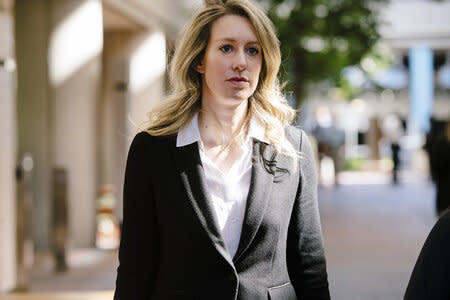Ex-Theranos Employee Who Tried To Visit Elizabeth Holmes After Conviction Stands By Testimony As Her Lawyers Push For New Trial
- Oops!Something went wrong.Please try again later.
Federal prosecutors have said that an effort by a former Theranos employee who testified against founder Elizabeth Holmes at her fraud trial to have a "healing" conversation is not grounds to throw out her conviction.
Lawyers for Elizabeth Holmes had said in a motion filed just after Labor Day that Adam Rosendorff — the former Theranos laboratory director who resigned and eventually testified against her at trial — went to the home that she shares with partner William Evans on the evening Aug. 8 shortly after leaving a message with her lawyer to request a meeting, according to court documents previously obtained by Law & Crime.
RELATED: Who Was Elizabeth Holmes' Neighbor Who She Accused Of Making A Patent To Spite Her
Evans, the lawyers said, met Rosendorff in the driveway, where Rosendorff allegedly explained that he had difficulty sleeping because of the trial and his testimony. According to Evans and Holmes' lawyers, Rosendorff explained to Evans that "he tried to answer the questions honestly at Ms. Holmes' trial, but the government tried to make everyone look bad" and "make things seem worse than they were." He noted that both he and Holmes were young when they worked together and that people at Theranos had been very idealistic, adding that he now felt bad about the trial and wanted to talk to Holmes as he felt it would be "healing" for them.

Elizabeth Holmes, founder and former chief executive officer of Theranos Inc., leaves federal court in San Jose, California, U.S., on Wednesday, Oct. 2, 2019. Photo: Getty Images
Evans turned Rosendorff away. A month later, Holmes' lawyers filed a motion with the court to overturn the verdict or hold an evidentiary hearing based on the meeting, claiming that "Dr. Rosendorff’s statements reflecting his concerns with the government’s presentation of his trial testimony, along with his comments that bear on Ms. Holmes’ intent, put the integrity of the jury verdict against Ms. Holmes in grave doubt."
On Wednesday, federal prosecutors filed their motion in response, disagreeing with the defense's assessment and offering a sworn statement by Rosendorff disputing the defense's characterization of the meaning of his abortive attempt to meet with Holmes, according to court documents obtained by Law & Crime.
First, they noted that, even if Rosendorff had fully recanted his testimony — and he had not — a witness recantation does not automatically mean that a defendant gets a new trial. And, they noted that Evan's recollection of the brief conversation, of which he made no recording or video and did not swear to in an affidavit, was not equivalent under the law to Rosendorff's sworn declaration that he did not and does not recant his testimony.

These Are The Chilling Crime Scene Photos From Jeffrey Dahmer's Apartment
In that sworn declaration, Rosendorff both stood by his testimony and refuted the defense's assertion that the government did anything more than encourage him to tell the truth.
“Nothing I have learned since giving my testimony has changed my recollection of the events I witnessed during my time at Theranos,” Rosendorff stated. “I stand by my testimony at Ms. Holmes’ and [Sunny] Balwani’s trials in every respect.”
He also explained his reasoning for wanted to speak with Holmes to find, as Evans termed it, "healing": According to his sworn declaration, he "feels compassion for Holmes and Balwani, and even more so for their families who will be affected by any punishment that results from Defendants' conduct."
Holmes was convicted on Jan. 3 of three counts of wire fraud and one count of conspiracy to commit wire fraud, out of 11 charges the government brought against her. The jury acquitted her on four other charges and deadlocked on three after a three-month trial in which she testified, among other things, about having been both the victim of a sexual assault while at college and of an allegedly abusive relationship with her much-older Theranos co-founder, Balwani.
Balwani, who was tried separately, was convicted of 10 counts of wire fraud and two counts of conspiracy. He denied being abusive toward Holmes.
She is due to be sentenced on Oct 17, while Balwani's sentencing is set for November. Both could face up to two decades in prison.
U.S. District Judge Edward J. Davila will consider the defense's motions to dismiss the Holmes verdict on Oct. 3.
